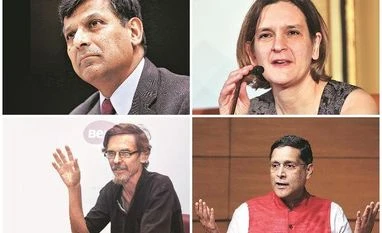More than economists, it is former union finance secretaries who are the appointees of choice for most states as economic advisors. Four of them are now in the ranks of advisors in different states. Following them are former chief secretaries.
Economists, despite the flutter created by Tamil Nadu, seem to rank after them. Among the list of economists, the Economic Advisory Council of Tamil Nadu obviously leads them all. Getting Raghuram Rajan, Esther Duflo, Jean Dreze and Arvind Subramanian on the same table is a lead other states could take time to figure out and follow. Yet, even in that list, the fifth member is former union finance secretary S Narayan.
Also, while chief ministers have allowed former officers to explore both revenue and expenditure departments in their role as advisors, all states have limited the remit of economists to that of only expenditure.
In Tamil Nadu, notice that none of the economists are from the field of public finance. Finance minister P T R Palanivel Thiagarajan of the M K Stalin-led DMK government has been careful in this respect. States are careful to keep revenue issues limited to only political appointees. Despite the large bucket list of tax priorities the 15th Finance Commission has handed out, no state government, as yet, is willing to let independent experts decide on fiscal policies. The independent experts in all states have been only handed the role of creating and vetting expenditure policies.
While Tamil Nadu has got a flamboyant list, it was not the first from the block. That honour went to its neighbour, Kerala when it appointed Gita Gopinath as its financial advisor five years ago, in 2016. She lasted a bit less than two years in office before moving on as chief economist at the IMF. She also focussed on the expenditure priorities of the Pinarayi Vijayan led LDF government.
At the other extreme was Haryana. Chief minister Manohar Lal Khattar too appointed an Economic Advisory Council when he returned to office in 2019 for the second term. But the council included no economists. Instead it included the state finance minister, the chief secretary, as well as secretaries of the finance and revenue departments, besides industry leaders from real estate, managing directors of banks, country heads of major IT firms based in Haryana and so on.
Somewhat similar is the approach of Karnataka. Chief minister B S Yeddiurappa appointed Karnataka's Startup Vision Group chairman Prashanth Prakash as Advisor (policy & strategy) to the chief minister. Again, Prashanth is not from an economics background but holds a master’s degree in computer science from the University of Delaware, USA.
Even if not on as grand a scale as Tamil Nadu, all the southern states have appointed economic advisors. But just as Chennai has depended on former finance secretary S Narayan to create the star cast, Andhra Pradesh too has appointed another former finance secretary Subhash Garg as advisor to the chief minister Y S Jaganmohan Reddy. It is to be seen if Garg also plans on assembling a larger team.
In Telangana, it is G R Reddy who is presently advisor to the government with the rank of a cabinet minister. A practising economist, one of Reddy’s seminal academic works is the joint editorship of a book “Indian Fiscal Federalism” with Dr. Y V Reddy in 2019. Both Telangana and AP have also appointed numerous former IAS officers as advisers to guide key ministries. Former IT secretary in the union government, S Satyanarayana led the IT expansion project for the AP government.
It is the north Indian states which are now beginning to warm up to the task. But some of those economically correct policies recommended by the advisors could be difficult political exercises because of which the states are cautious.
Punjab has had a jolt in this respect. It appointed former deputy chairman of the Planning Commission, Montek Singh Ahluwalia to write a ‘medium and long term post-COVID economic strategy for Punjab’. Ahluwalia suggested capping the free power scheme for agriculture and weaning farmers away from paddy cultivation to improve the state finances. Both proved political bombshells for chief minister Amarinder Singh of Congress, who had to hastily disown the report.
West Bengal chief minister Mamata Banerjee has decided to appoint economic advisors for all key departments. She has sought out the help of her new chief advisor Alapan Bandyopadhyay, former chief secretary for this exercise, to avoid mine fields like in Punjab. It is for the same reason that Bihar chief minister Nitish Kumar has appointed Anjani Kumar Singh, the former chief secretary as Advisor, Policy and Programme Implementation with the rank of a minister of state.
Rajasthan too has therefore walked the tightrope. Chief Minister Ashok Gehlot’s Economic Transformation Advisory Council is led by IAS officer and economist Arvind Mayaram as vice president. The state’s chief secretary, additional chief secretary (finance) and the principal secretary to the CM are ex-officio members of the council. The economist in the team is Ashok Gulati, while Anil Agarwal, founder and chairman of Vedanta Resources Limited; Lakshmi Niwas Mittal, chairman and CEO of ArcelorMittal and actor Nandita Das also make the list.
The latest to join the expanding list is Madhya Pradesh. State chief minister Shivraj Singh Chouhan appointed economist Sachin Chaturvedi as vice chancellor of Atal Bihari Vajpayee Institute of Good Governance and Policy. Chouhan is the chairman of the institute along with all the key heads of the state government.
Unlock 30+ premium stories daily hand-picked by our editors, across devices on browser and app.
Pick your 5 favourite companies, get a daily email with all news updates on them.
Full access to our intuitive epaper - clip, save, share articles from any device; newspaper archives from 2006.
Preferential invites to Business Standard events.
Curated newsletters on markets, personal finance, policy & politics, start-ups, technology, and more.
)